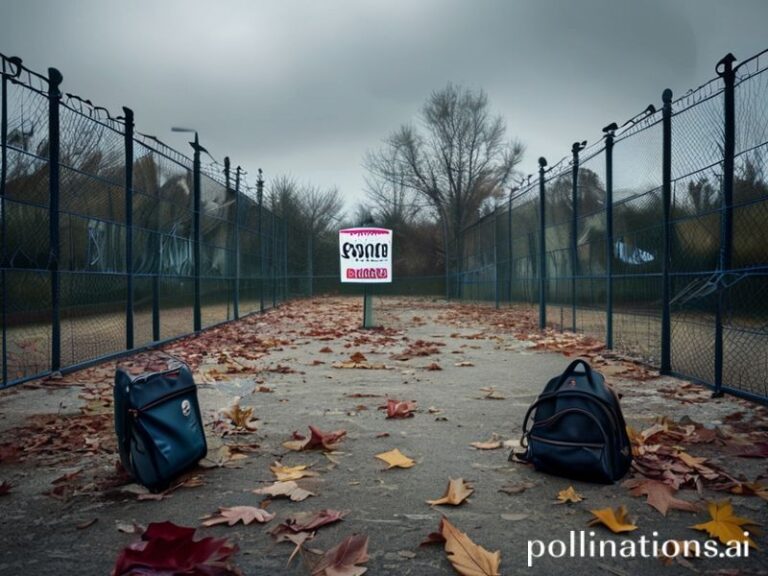From Riyadh to Reykjavik: How Whitney Wolfe Herd Turned Loneliness into a Global Currency
Dispatch from the Global Swipe-Right Industrial Complex
by our correspondent in exile, still waiting for someone to reply
Whitney Wolfe Herd is not, despite the headlines, the patron saint of empowered single women from Jakarta to Johannesburg. She is merely the woman who figured out how to monetize the universal human fear of dying alone—then franchised it from Silicon Valley to the steppes of Mongolia (yes, Bumble is now optimistically available in Ulaanbaatar; lonely yak-herders swipe while their livestock graze). In doing so she has become the unlikely geopolitical weather vane of Generation Screen: wherever her apps spiral, the rest of us can read the barometric pressure of romance, capital, and power.
Let’s begin with the obvious: Bumble’s pastel rebranding of patriarchy—women “make the first move”—was never about smashing glass ceilings. It was about shifting the ceiling a few inches higher so advertisers could hang prettier chandeliers. Investors from Singapore to Stockholm applauded, not because they suddenly joined the sisterhood, but because a “female-friendly” algorithm promised untapped demographics and thus higher ARPU (average revenue per unloved person). The share price jumped accordingly, proving once again that feminism is most lucrative when packaged in a soft-focus millennial pink.
Meanwhile, in countries where dating apps are less about brunch selfies and more about avoiding the morality police, Wolfe Herd’s gospel lands with the subtlety of a drone strike. In Saudi Arabia, Bumble’s arrival was heralded as liberation—until local regulators discovered women could also match with other women. The app vanished from the App Store faster than you can say “Vision 2030.” In India, the company’s billboards promised “equal relationships,” a charming notion in a nation where brides still come with dowries rivaling the GDP of small island nations. Local competitors like TrulyMadly responded by adding astrological filters, because even algorithmic love must first pass the scrutiny of Saturn.
But the real international coup is subtler: Wolfe Herd has exported American dating culture the way McDonald’s once exported cholesterol. Parisians now debate “ghosting” over cigarettes; Nigerians schedule first dates around generator-powered Wi-Fi; and in Tokyo, salarymen use Bumble Bizz to network while pretending they’re not actually looking for a hostess bar that accepts LinkedIn endorsements. The world’s lonely hearts have been standardized into a single, gamified SKU, complete with in-app purchases for “SuperSwipes” and existential dread.
Of course, the pandemic was Christmas morning for the company. While airlines collapsed and nations hoarded toilet paper, Wolfe Herd’s user base soared like a SpaceX rocket funded by people who haven’t touched another human in 18 months. Virtual dating became a UN-sanctioned form of diplomacy: a London banker could now drink lukewarm wine with a Buenos Aires designer while both wondered if their governments would ever let them leave the house again. Bumble obligingly rolled out video-chat features—because nothing says romance like buffering and the faint sound of your date’s roommate coughing.
The broader significance? We have achieved peak late-capitalist intimacy: an Austinite billionairess redefining mating rituals from Lagos to Lima, her algorithms quietly ranking desirability like Moody’s downgrades sovereign debt. Every swipe is a data-point sold to advertisers hawking scented candles and antidepressants. National moods can now be inferred from emoji usage trends. And when the next geopolitical crisis hits—say, a water war along the Mekong—rest assured someone will be swiping right on a humanitarian worker’s profile, asking if they’re “DTF: Down To Flee.”
In conclusion, Whitney Wolfe Herd hasn’t just built a dating empire; she’s built the world’s most polite surveillance state, where loneliness is the commodity and heartbreak the transaction fee. Somewhere in a glass-walled Austin office, pastel Post-it notes remind staff to “be kind,” while servers in Iceland cool the heat of 100 million restless libidos. The rest of us keep swiping, praying that love—or at least a mutually beneficial visa arrangement—is only one SuperSwipe away. Until then, we remain citizens of the Republic of Perpetual Maybe, passports stamped with the faint scent of vanilla algorithm.







